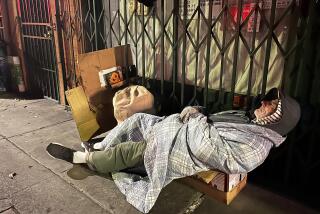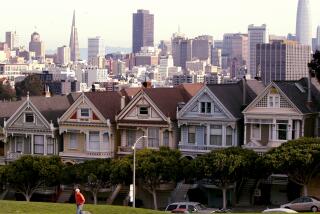Building a better billboard law in L.A.
Many major thoroughfares in Los Angeles, especially on the Westside and in Hollywood, were a little less glaring this week, a little less distracting, a little — OK, fine, let’s come out and say it — less tacky. That’s because a judge ordered mammoth billboard companies Clear Channel Outdoor and CBS Outdoor to switch off the more than 100 electronic billboards they put up after reaching a virtually secret, and illegal, deal with the City Council in 2006.
The deal was secret in part because it purported to resolve a lawsuit the companies brought to challenge the city’s sign ordinance, so discussion was conducted in closed session and council members never disclosed, until after they adopted the accord, that it allowed the companies to digitize dozens and dozens of their conventional signs — many of which had lapsed permits.
And maybe it was secret in part because council members were understandably ashamed of it.
The deal was illegal in part because it wrote onto the books dozens of zoning variances without the public notice and hearings required by law. It was eventually struck down in court, not because city leaders came to their senses or decided to finally stand up to the companies on behalf of their constituents but because a third company wanted a piece of the digital sign action and sued over the exclusive bargain.
Now city planning experts and the council must work to regain some semblance of control over the city’s permit and legal processes as well as its built and visual environment. To do that, they would be wise to consider all pending billboard legislation together — proposals not just for digital signs but for limited and clearly defined special geographic districts where such signs would be permitted, for inspection of conventional as well as digital signs, for removal of signs with lapsed permits (or that never had permits in the first place), for enforceable restrictions on advertising tobacco, alcohol and perhaps other products near schools and other sensitive sites, for enumerated benefits to communities where signs are to be located, and perhaps, if feasible, for revenue to the city’s general fund.
It’s a tall order, but a comprehensive approach to the sign issue is necessary to prevent the kind of anything-goes attitude that advertising companies and elected officials have taken for too long in Los Angeles.
At stake is more than merely the threat to traffic safety that might be caused by distracting digital signs or the right of residents to quiet enjoyment of their homes without electronic billboards flashing in the windows. There is a widespread perception, ratified time and again by one project or another, that city streets and neighborhoods are for sale and that the people who pay the price — the neighbors and the public at large — are not the ones who reap the benefits.
It is true that in a struggling economy we need jobs, especially construction jobs. We need amenities like parks, but we lack the resources to pay for them. We need business and development and can’t just turn up our collective noses because we dislike a plan or a design. We have a city budget in perpetual trouble, and city officials are on the constant prowl — as they should be — for new sources of revenue.
Some are also on a less laudable prowl — for campaign donations.
Those needs bring forward people and companies that offer to fill them, such as billboard companies. It’s fine to engage in discussions about providing city benefits in exchange for private projects, but not without full public hearings and input. It’s not fine to suspend city laws in search of those benefits. And it borders on corruption to bend to a political donor’s will.
One example of the anything-goes approach to help one company (although in this case there’s no hint of corruption) is the bill sponsored by former City Council president, current state senator and now secretary of State candidate Alex Padilla, which would allow new off-site digital billboards near stadiums and adjacent freeway offramps and allow them, in a switch from current state law, to advertise products and services other than those sold in the particular venue. The bill would make the proposed Farmers Field development near downtown Los Angeles more lucrative for the owners, or at least more viable, and to be sure, Los Angeles could use the jobs and the economic boost provided by the stadium project. But the bill appears to be an example of a company pressing its advantage to win special treatment rather than one that is content to play by the rules. It would conflict with what should be a priority for the city: to reduce, and not to expand, the number of favors and special deals granted to companies with economic clout.
By the same token, Clear Channel and CBS would be wise to try a different approach. They too often have acted like bullies, pressuring city officials to strike yet another deal to allow them to continue operating their digital signs in advance of court rulings against them, and, failing that, threatening a new $100-million lawsuit against the city for loss of their investment and the revenue that the signs produce.
The City Council does indeed have unclean hands, having signed off on an improper deal seven years ago, but the billboard companies were hardly innocent bystanders. They were parties to the deal, and were sophisticated enough to know the deal might not be enforceable. And it’s difficult to be entirely sympathetic with them, given the financial windfall they have received from operating their signs until this week, when they complied with the order to turn them off.
And their campaign to convince Angelenos that their billboards, in and of themselves, provide community benefits in the form of valuable information is simply not credible. They should be reminded that there are nearby cities that have absolute billboard bans, where residents and drivers alike enjoy relief from visual blight without, apparently, suffering any ill effects from being cut off from the signs’ messages.
More to Read
A cure for the common opinion
Get thought-provoking perspectives with our weekly newsletter.
You may occasionally receive promotional content from the Los Angeles Times.










